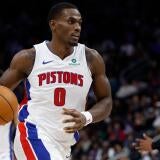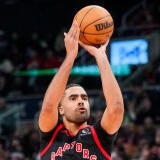Isaiah Thomas is a starting point guard once again: A timeline of his journey from the Celtics to the Wizards
Thomas forced his way into the starting lineup after just three games with the Wizards
A few hours before the Washington Wizards' game against the Detroit Pistons on Monday, coach Scott Brooks moved Isaiah Thomas into the starting lineup. In just his fourth game with the club, Thomas had earned a starting spot for the first time since his brief tenure with the Los Angeles Lakers during the 2017-18 season.
Thomas had his worst game as a Wizard, finishing with nine points and six assists on 4-of-12 shooting in their 115-99 win, but the start was symbolic. For multiple seasons, Thomas has been trying to overcome injuries and get back to the All-NBA level he reached with the Boston Celtics.
"I'm not gonna lie to you. It did break me at times, but it can't storm forever. The sun has to come out at some point," Thomas said about the past two seasons.
Thomas, signed a one-year, $2.3 million deal with the Wizards this past summer. It was a paltry sum for a player who talked about the Celtics needing to "bring out the Brinks truck" to keep him a few years ago, but it represented a chance for a fresh start on a team in desperate need of playmakers.
So far, Thomas has made the most of that opportunity. In his first three games off the bench, he averaged 16.3 points and 7.6 assists, prompting his promotion. The Wizards are still monitoring his minutes, but this is easily the closest he's looked to his pre-injury form.
As Thomas continues his slow grind, let's take a look back at all the ups and downs of his past few years.
Celtics: Makes two All-Star Games, gets hurt, traded for Kyrie Irving
The Celtics stole Thomas from the Suns at the trade deadline in 2015 in what was a pretty unheralded move at the time. Once the last pick in the draft, Thomas had proved he belonged in the league, but no one saw him as a star.
That's just what he became in Boston, however, blossoming into one of the league's best point guards. He became a fan favorite for the heart and determination he showed, made two straight All-Star Games, and his 2016-17 season is arguably one of the most impressive offensive campaigns of all-time considering his size. He finished third in the league in scoring at 28.9 points per game, and helped lead the Celtics to the best record in the East.
Ahead of the playoffs, however, tragedy struck. His sister, Chyna Thomas, died in a car accident ahead of the Celtics' first playoff game against the Bulls. After an emotional few days, Thomas decided to play through his grief, and helped lead the Celtics to the Eastern Conference finals.
During Game 2 of the ECF, he re-aggravated a hip injury he suffered in March of that season, and was unable to play the rest of that series. It turned out to be the last game he would ever play for the Celtics.
In August of 2017, Boston traded Thomas to the Cavaliers in a blockbuster deal for Kyrie Irving. The move was delayed by a dispute about Thomas' health, and ultimately the Celtics included an extra pick to ease the Cavs' concern. The deal was completed, but that foreshadowed his tumultuous path ahead.
Cavaliers: Sits out first half of the season, traded to the Lakers after 15 games
Opting against hip surgery, Thomas went through vigorous rehab in an attempt to return to the court. By late December he was scrimmaging with the Cavs' G-League team, and on Jan. 2, after missing Cleveland's first 36 games, he made his debut against the Trail Blazers.
He scored 17 points off the bench, but it was immediately clear he wasn't his old self. His usual burst and athleticism wasn't there, which would be a problem for any player, but especially a 5-9 point guard. There was no reason to expect Thomas to pick up where he left off in Boston after a serious injury. The problem was that the Cavs didn't have the luxury of time.
With Irving's departure, and uncertainty about LeBron James' future with the team, that was a strange season in Cleveland. The team seemed to exist in a state of disarray, and at the deadline hit the reset button by shipping out nearly half the roster, desperate to give James a supporting cast he believed in. Thomas was dealt to the Lakers along with Channing Frye and a first-round pick in exchange for Larry Nance Jr. and Jordan Clarkson.
Lakers: Plays for a few weeks, gets shut down to undergo surgery on his hip
Thomas joined a young Lakers team with low expectations. If there was any silver lining, it was that the environment gave Thomas much more freedom than he had in Cleveland. He could just try to play himself into shape.
That experiment didn't last long. After just a few weeks, it was clear Thomas' hip was still causing him problems, and the Lakers shut him down so he could have surgery. He ended up playing 17 games — two more than he played with the Cavs — including one start, the last he would earn until this week.
Nuggets: Signs a one-year deal, spends much of the season rehabbing, barely plays
In the summer of 2018, Thomas became an unrestricted free agent. Before the injury a max deal was a real possibility, but he was only able to secure a one-year, veteran's minimum deal worth $2 million from the Nuggets.
Denver had been in need of an experienced point guard, and Thomas seemed to fit the bill. If he could give them bench scoring and a veteran presence, it would be a real boost for their playoff hopes.
None of that came to pass, however, and it wasn't anyone's fault. Thomas missed much of the season recovering from his surgery, and by the time he was able to play again Monte Morris had emerged as one of the league's better backup point guards. The Nuggets were no longer a playoff hopeful in need of a spark; they were one of the West's best teams, enjoying the chemistry that comes along with that.
Thomas ended up playing 12 games off the bench, but he didn't get on the court down the stretch or in the playoffs. Nonetheless, he stayed professional, and the Nuggets raved about his presence in the locker room.
Wizards: Signs a one-year deal, earns starting spot
Heading into this summer, it wasn't clear Thomas still had a place in the league. He was stuck in a catch-22, where he needed to actually play on a consistent basis to get his groove back, but most teams weren't willing to commit to him without seeing him play.
That's where the Wizards came in.
"I chose the Wizards because they looked me in the eye and told me they would give me an opportunity," Thomas said. "And I can't thank them enough."


















